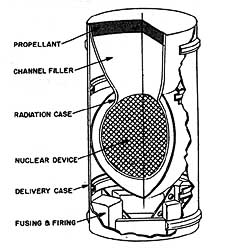
Posted on 11/23/2005 11:41:04 AM PST by BenLurkin

> "what if it misses Earth but takes out the Moon?"
See my earlier post for a general answer. But in the case of Apophis, the impact energy is only about 2000 megatons. Make a nice crater a few miles wide, b ut nothign more than that. The dino killer was 300,000,000 megatons in comparison, made a crater on Earth more'n a hundred miels wide. The lunar surface ahs craters *far* biggern'd than.
Apophis is actually a good test subject. We've got enough time, it comes close, and it's the right size... we could go and shove it off course. A lunar impact would actually be a good idea... it'd bring to an end any chance of it hitting the earth. If we were really good, we'd put in it Earth orbit and mine it, but the propulsion systems available aren't up to the task yet. Acceleration would be far to low to brake into orbit.
OK, that was odd. Copy-and-paste malfunction. One more time:
> I guessing that any "ejecta" might pose a threat of hitting Earth and complicating space exploration for a while until it had landed somewhere here or back on the moon.
Very possibly, if the ejecta is thrown up at faster than lunar escape velocity. Some would go into a very elliptical Earth orbit, some into solar orbit, some into lunar orbit, and soem woudl rain back down onto the moon. The stuff in Earth and solar orbits would continue to pose threats due to the complex nature of *4* body gravitational problems. Bleah.
A nifty sci-fi treatment of this was in "Moonfall" by, IIRC, McDevitt. A very unlikely asteroid, big and moving at several hundred km/sec, slams into the lunar far side hard enough to completely disrupt the moon. The vast bulk of the lunar rubble stays in more or less the same orbit around the Earth... but "more or less" means enough variability that it eventually smears out into a ring system/asteroid belt. Only a very tiny fracion would be blasted towards the Earth.
A tiny fraction of the moon, though, is a lot of stuff...
As for tides... so long. Smear the moon into a ring and lunar tides go away. You'd still have solar tides, and minor tides created by the larger lunar chunks... but if there's not a distinct mass concentration, the lunar chunk tides woudl cancel out. So, so long surfing, so long tidal ecosystems, so long climate as we've known it. So long a goodly portion of the ocean ecosystem too, most likely.
D'oh.
nice .... that one would pretty much kill all multicellular life
Yes, and P'O'd the pre-historic liberals in the process ;-). Just another cycle of global cooling. Part of the natural order of things.
Your screen name is very appropos to this thread 8-).
http://neo.jpl.nasa.gov/risk/a99942.html
Close encounters in 2036, 2037, 2054, but not in 2029 (although 2029 was at first thought to be the dangerous one).
old FR topic:
Scientist: Asteroid May Hit Earth in 2029
Yahoo/AP | 12/23/04 | JOHN ANTCZAK
Posted on 12/23/2004 8:24:16 PM PST by hole_n_one
http://www.freerepublic.com/focus/news/1307719/posts
For those who get it, anyway...

The trouble with Apophis, Mr. Schweikart said, is that that one chance cannot yet be ruled out.
Because usually when an event has a 1 in 5,500 chance you can rule out that one chance.
The Planetary Report article from last summer, outlining the problem and explaining why we may need a mission to it in the next decade to determine if it is really a problem in time to prevent a disaster, is finally online here.
Very interesting link. Thank you.
Ping -- updated information at post 71.
Disclaimer: Opinions posted on Free Republic are those of the individual posters and do not necessarily represent the opinion of Free Republic or its management. All materials posted herein are protected by copyright law and the exemption for fair use of copyrighted works.